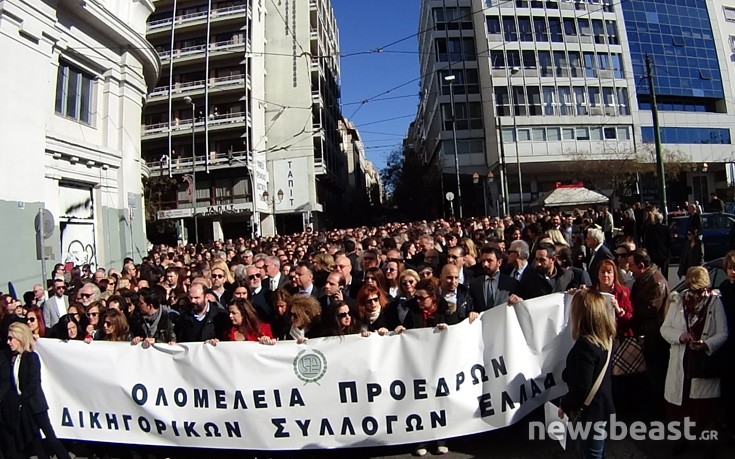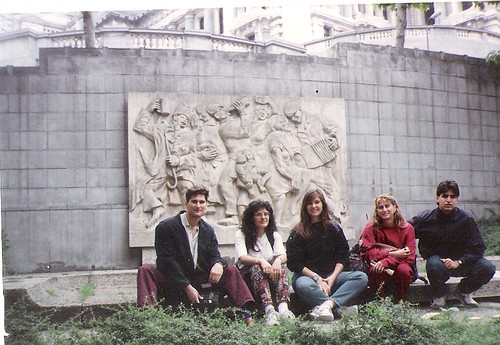I spent a whole morning yesterday observing the goings on at my local ΙΚΑ (recently renamed ΕΟΠΠΥ, and even more recently, ΠΕΔΥ) branch, as I was waiting for my turn to update a health document.
The woman walked through the doors, holding a plastic supermarket carrier bag in one hand and a water bottle in the other. Her black tracksuit pants looked rather tight on her - perhaps she needed a larger size. They were matched by a white cable knit jumper with a sleeveless jacket. Her sports shoes were well worn. Her curly dark hair was neatly tied back into a little pony tail. She looked young, less than a quarter of a century. The young child that was trailing by her side like a beloved pet dog on a leash looked clean and well dressed. Number 92 was lit up on the priority number system. She looked at her paper: 85. She passed by all the other waiting people and stood in front of an assistant who was serving another customer.
"My number'th passed," she said, showing them the ticket. "Can I get intyu the chew now?" She spoke with what seemed like a lisp; her two front top teeth were missing.
"Only if someone else lets you pass," the assistant said without looking up away from her computer screen.
The woman did not seem to comprehend what she was told. No one spoke to her. They all continued to do what they were doing before she entered: The customers who were being served by the two assistants stood steadfast in front of the window in fear of losing their priority; the assistants continued to type and stare at the keyboard; the people in the waiting room checked their documents and cellphones.
"Can I path thwoo now?" the woman asked again. She edged closer to the window and put her hands on the ledge. The man standing next to her in front of the assistant's window gathered his documents, fearful they may get dirty from the water bottle that was slightly dripping.
"You'll have to come back tomorrow," the assistant replied.
A slight pause as the woman comprehended that last statement. And then a cry of anger:
"You bissch! I'f been here since the morning, with my shild, and you won't sherve me! You bloody bissch!"
And still, no one paid the woman any attention. She grabbed the child (who was still smiling) and left the room, cursing as she left.
"What's the matter, love?" a old-age pensioner asked her.
"Bissches! They don't want to help me! They don't care!" By now, she was crying. The pensioner asked her what help she needed, but the woman continued to wail, patting the child's head at the same time as she hugged it close to her.
"It wath my turn! They diden let me thwoo! I'fsh been here since the morning, with my shild, and they won't help me!" The old man shook his head.
"What number are they at now?" he asked, but he did not get any reply. The woman was continuing to shout and cry. The man walked away, checking his priority number before going inside to see what number was blinking.
The woman was now talking on her cell (not smart) phone: "Bloody bissches! They tols me to come back tomowow! How am I gonna come back tomowow?! Bloody bissches! I'm gonna call the police!" She must have said the word 'police' a couple more times before the supervisor came out of her office.
"What does she want?" the supervisor asked. "Tell her to come and see me." The few people in the office that had managed to secure a seat did not want to give it up that easily. The supervisor repeated her call: "Can someone tell her to come and see me." In the meantime, the woman continued wailing and shouting.
"She should have been given priority before she started using the 'police' word," said a girl wearing jeans, who was sitting on a seat waiting for her turn. "Everyone can see she isn't well in the head."
"Why she not well?" said the Albanian sitting next to her. "She look okay. She just lose number."
"She doesn't understand what's going on", said the girl. "She needs more help than you and me. And she has a child! She needs much more help than us." The Albanian nodded knowingly.
"She looked perfectly fine to me," said a fake-blonde well-dressed woman on the other side of the room.
"As fine as an illiterate country bumpkin," said the girl in the jeans. "She has no idea what she did wrong."
"We're all in the same boat," said the fake blonde. "We're all waiting."
The woman's cries continued to be heard. The supervisor again asked the others waiting to call the woman in. She herself did not leave her cubicle to do it herself. A man eventually told the woman that they would see her now: The woman was still sobbing when she entered the room.
"Come now," said the supervisor, "tell me, what would you like to do? How can I help you?" The woman stopped sobbing and handed her papers to the supervisor. The transaction went through without a hitch. The woman and the child left quietly. All's well that ends well.
While I was waiting to get my own paperwork sorted out, I took walks around the IKA (EOPPY- PEDY) area on the Souda road, which has never really got itself a proper facelift. It remains scruffy, despite the modern constructions that are replacing old rundown buildings. After a 4-hour wait, I got my job done too.
Although I'm trying to focus on what was happening in the case of the woman that I saw, it is fair to say that not only Daniel Blake types pass through IKA. Every sector of Greek society passes through those offices at some point. IKA is seriously understaffed - the staff are not incompetent. They are even quite polite these days. Health checks are available to everyone, whether they are registered in the system or not (see http://www.haniotika-nea.gr/dorean-exetasis-gia-olous-sto-p-e-d-i-chanion/). The Greek health system is much more democratic than the Daniel Blake type stories I read in The Guardian.
©All Rights Reserved/Organically cooked. No part of this blog may be reproduced and/or copied by any means without prior consent from Maria Verivaki.
The woman walked through the doors, holding a plastic supermarket carrier bag in one hand and a water bottle in the other. Her black tracksuit pants looked rather tight on her - perhaps she needed a larger size. They were matched by a white cable knit jumper with a sleeveless jacket. Her sports shoes were well worn. Her curly dark hair was neatly tied back into a little pony tail. She looked young, less than a quarter of a century. The young child that was trailing by her side like a beloved pet dog on a leash looked clean and well dressed. Number 92 was lit up on the priority number system. She looked at her paper: 85. She passed by all the other waiting people and stood in front of an assistant who was serving another customer.
"My number'th passed," she said, showing them the ticket. "Can I get intyu the chew now?" She spoke with what seemed like a lisp; her two front top teeth were missing.
"Only if someone else lets you pass," the assistant said without looking up away from her computer screen.
The woman did not seem to comprehend what she was told. No one spoke to her. They all continued to do what they were doing before she entered: The customers who were being served by the two assistants stood steadfast in front of the window in fear of losing their priority; the assistants continued to type and stare at the keyboard; the people in the waiting room checked their documents and cellphones.
"Can I path thwoo now?" the woman asked again. She edged closer to the window and put her hands on the ledge. The man standing next to her in front of the assistant's window gathered his documents, fearful they may get dirty from the water bottle that was slightly dripping.
"You'll have to come back tomorrow," the assistant replied.
A slight pause as the woman comprehended that last statement. And then a cry of anger:
"You bissch! I'f been here since the morning, with my shild, and you won't sherve me! You bloody bissch!"
And still, no one paid the woman any attention. She grabbed the child (who was still smiling) and left the room, cursing as she left.
"What's the matter, love?" a old-age pensioner asked her.
"Bissches! They don't want to help me! They don't care!" By now, she was crying. The pensioner asked her what help she needed, but the woman continued to wail, patting the child's head at the same time as she hugged it close to her.
"It wath my turn! They diden let me thwoo! I'fsh been here since the morning, with my shild, and they won't help me!" The old man shook his head.
"What number are they at now?" he asked, but he did not get any reply. The woman was continuing to shout and cry. The man walked away, checking his priority number before going inside to see what number was blinking.
The woman was now talking on her cell (not smart) phone: "Bloody bissches! They tols me to come back tomowow! How am I gonna come back tomowow?! Bloody bissches! I'm gonna call the police!" She must have said the word 'police' a couple more times before the supervisor came out of her office.
"What does she want?" the supervisor asked. "Tell her to come and see me." The few people in the office that had managed to secure a seat did not want to give it up that easily. The supervisor repeated her call: "Can someone tell her to come and see me." In the meantime, the woman continued wailing and shouting.
"She should have been given priority before she started using the 'police' word," said a girl wearing jeans, who was sitting on a seat waiting for her turn. "Everyone can see she isn't well in the head."
"Why she not well?" said the Albanian sitting next to her. "She look okay. She just lose number."
"She doesn't understand what's going on", said the girl. "She needs more help than you and me. And she has a child! She needs much more help than us." The Albanian nodded knowingly.
"She looked perfectly fine to me," said a fake-blonde well-dressed woman on the other side of the room.
"As fine as an illiterate country bumpkin," said the girl in the jeans. "She has no idea what she did wrong."
"We're all in the same boat," said the fake blonde. "We're all waiting."
The woman's cries continued to be heard. The supervisor again asked the others waiting to call the woman in. She herself did not leave her cubicle to do it herself. A man eventually told the woman that they would see her now: The woman was still sobbing when she entered the room.
"Come now," said the supervisor, "tell me, what would you like to do? How can I help you?" The woman stopped sobbing and handed her papers to the supervisor. The transaction went through without a hitch. The woman and the child left quietly. All's well that ends well.
*** *** ***
While I was waiting to get my own paperwork sorted out, I took walks around the IKA (EOPPY- PEDY) area on the Souda road, which has never really got itself a proper facelift. It remains scruffy, despite the modern constructions that are replacing old rundown buildings. After a 4-hour wait, I got my job done too.
Although I'm trying to focus on what was happening in the case of the woman that I saw, it is fair to say that not only Daniel Blake types pass through IKA. Every sector of Greek society passes through those offices at some point. IKA is seriously understaffed - the staff are not incompetent. They are even quite polite these days. Health checks are available to everyone, whether they are registered in the system or not (see http://www.haniotika-nea.gr/dorean-exetasis-gia-olous-sto-p-e-d-i-chanion/). The Greek health system is much more democratic than the Daniel Blake type stories I read in The Guardian.
©All Rights Reserved/Organically cooked. No part of this blog may be reproduced and/or copied by any means without prior consent from Maria Verivaki.






































